WaterAid America CEO Sarina Prabasi on the Fundraising Power of Poop Jokes
March 02, 2018 | Filed in: Woman of the Week
As the CEO of WaterAid America, Sarina Prabasi tackles one of the world’s most daunting problems: the need for clean water. It’s a life-or-death matter, but she’s the first person to crack a joke about it—and then turn that joke into an international fundraising effort involving poop emojis. (The #GiveAShit campaign brought more than 11,000 new supporters to WaterAid and its work.) Here, Prabasi talks about growing up in Nepal, running a coffee shop with her husband, and why having two jobs makes her better at both.
THERE IS A KIND OF UNIVERSALITY in poop jokes. They appeal to all demographics and ages. WaterAid’s poop emoji campaign has been a good tool for engaging people on what can be a very serious, awkward, and uncomfortable topic. A lot of our work is about making sure people’s water isn’t contaminated with fecal matter. In communities that don’t have toilets, or proper sewage and sanitary facilities, it can cause a lot of illness and suffering. Having a sense of humor really helps when it comes to talking about that issue.
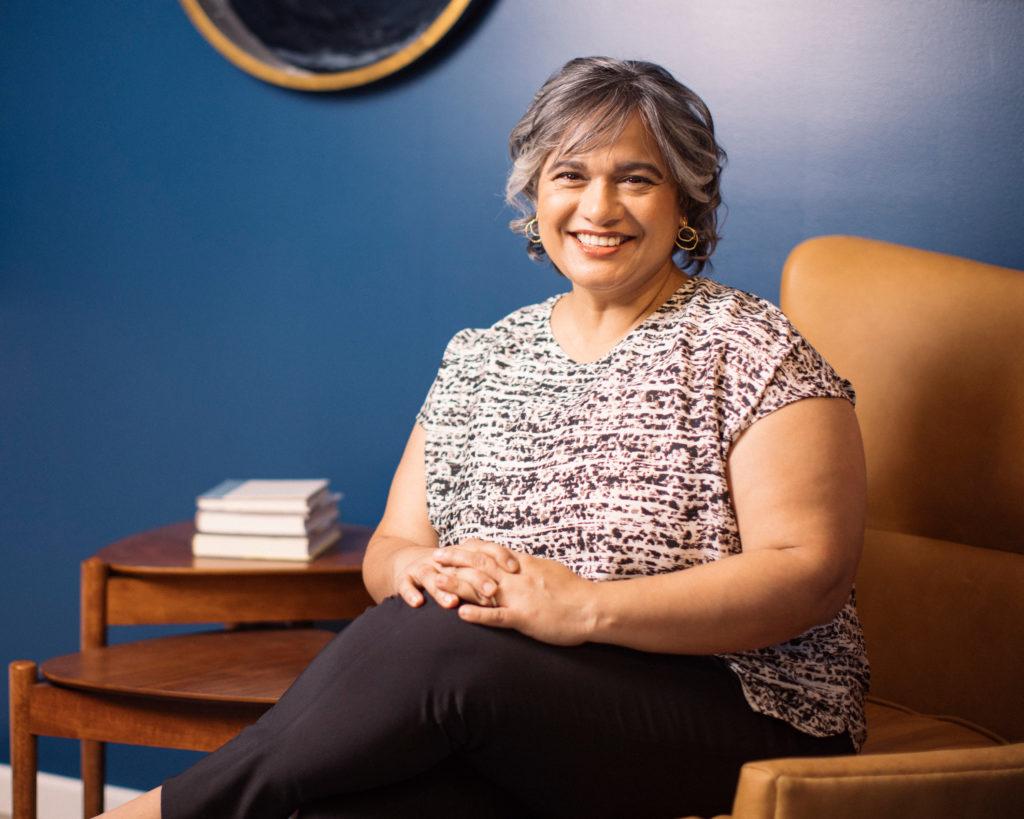
Sarina wears the Didion top in ink wash, the Foster pant in black, and the Oberon earrings.
I GREW UP ALL OVER THE PLACE. I was born in the Netherlands, and in my early childhood we lived in Thailand, India, and China. When I was in fifth grade, my family moved back to Nepal, partly so that my younger brother and I could grow up with the language and culture of our family. I finished high school there, and then I came to the U.S. on a scholarship to attend Smith College. Traveling and living in countries with big socioeconomic problems—as well as hugely rich cultures—definitely shaped the career I chose.
IN NEPAL, THERE’S A STRONG CULTURE OF GENDER ROLES and expectations for women and young girls. When we moved there, I remember feeling quite angry about it. It was my earliest understanding of broad systemic issues like sexism and gender discrimination, and I had to find creative workarounds to do the things I wanted to do. I had to ask myself how could I not only survive, but excel in an environment where society had very different expectations for me than I had for myself.
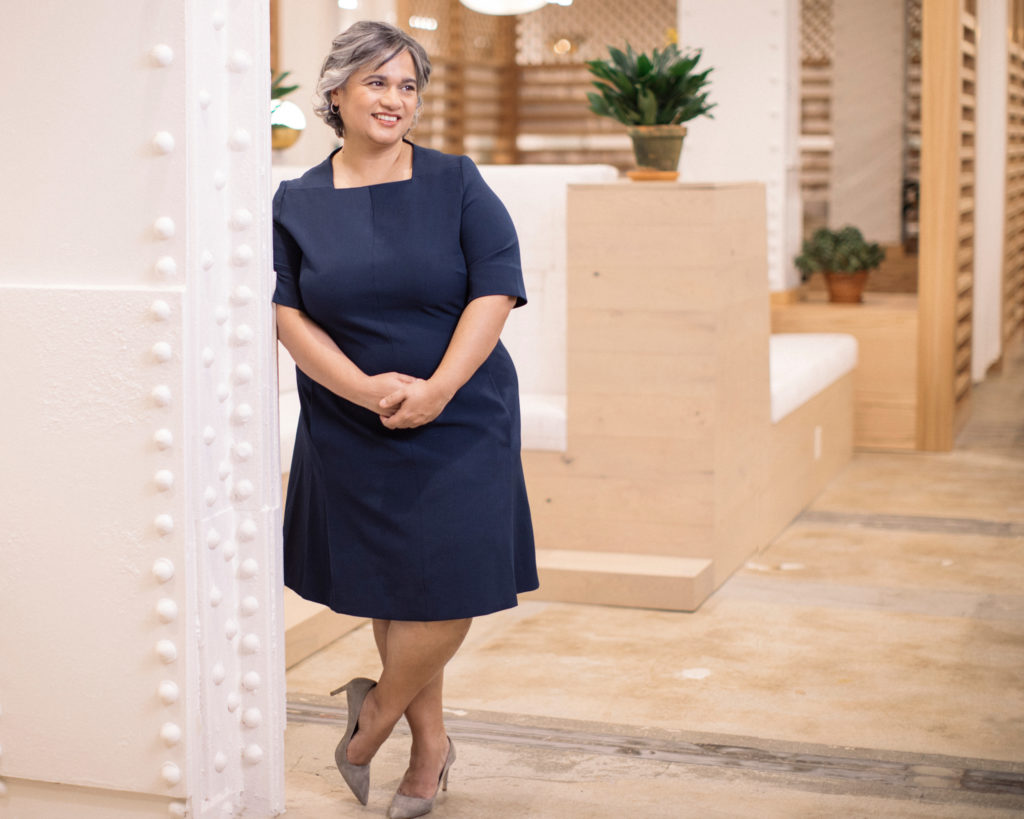
Sarina wears the Emily dress in galaxy blue, the Pave hoops in silver, and the Vanessa pump in gray.
WHEN I WAS APPLYING FOR COLLEGE SCHOLARSHIPS in the U.S., my extended family and their friends were very discouraging. They would talk to my dad about it, because in that culture he was seen as the decision maker, and say, “Are you nuts? Why are you going to send her to the U.S.?” The thinking was, “Why on earth would you invest in your daughter’s education?” But my parents and my younger brother were very supportive. It taught me to focus on what I was trying to achieve, and not try to fight every battle at the same time.
IN THE FIRST PART OF MY CAREER, I worked for an organization that did multi-sector work in health, education, and responding to the HIV and AIDS crisis. It was a good training ground, and a way to understand the interconnectedness between these different issues. Then I ran WaterAid in Ethiopia for about five years. When you start connecting the dots, water and sanitation is linked to everything—women’s empowerment, education, nutrition, entrepreneurialism. Water also plays a big part in conflict resolution in many areas where people depend on natural resources for their livelihoods.
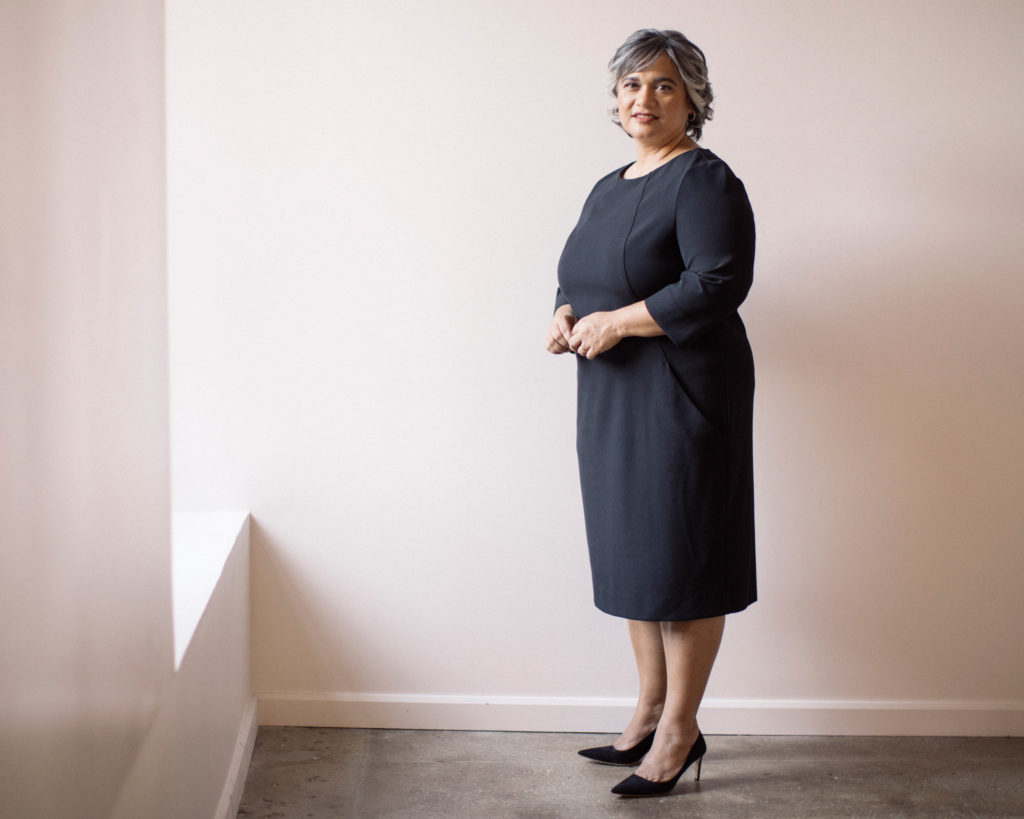
Sarina wears the Etsuko dress in black, the Pave hoops in silver, and the Vanessa pump in black.
WATERAID IS A HUGELY IMPORTANT PART of my life and work and profession, but it’s not the only thing that I do. My husband and I also own a small coffee business together in Washington Heights, right around the corner from our home in Manhattan, which we started six years ago. People say, “Oh my god, you’re crazy to take on so much,” but having interests and projects outside of my job makes me think about problems in different ways. I’m better for it.
WHEN WE MOVED FROM ETHIOPIA to New York in 2011, it was a real challenge for us. My husband and I come from completely different countries and cultures, and he had to leave a very active social network, friends, family, and work to come here for my job. Starting over in a new place in our late thirties was a big risk, to put it lightly, in terms of our relationship. He was quite overwhelmed and wondering if he made a horrible mistake. We also had an 18-month-old daughter at that point, so there was a lot to figure out. Now that we’ve done it, I can say that opening a coffee business is the perfect way to settle into a new community. Ethiopians are very proud of their coffee, so it allowed my husband to take something from a place we both love, and share it with other people. My husband runs the shop, and I help out with strategy and communications.
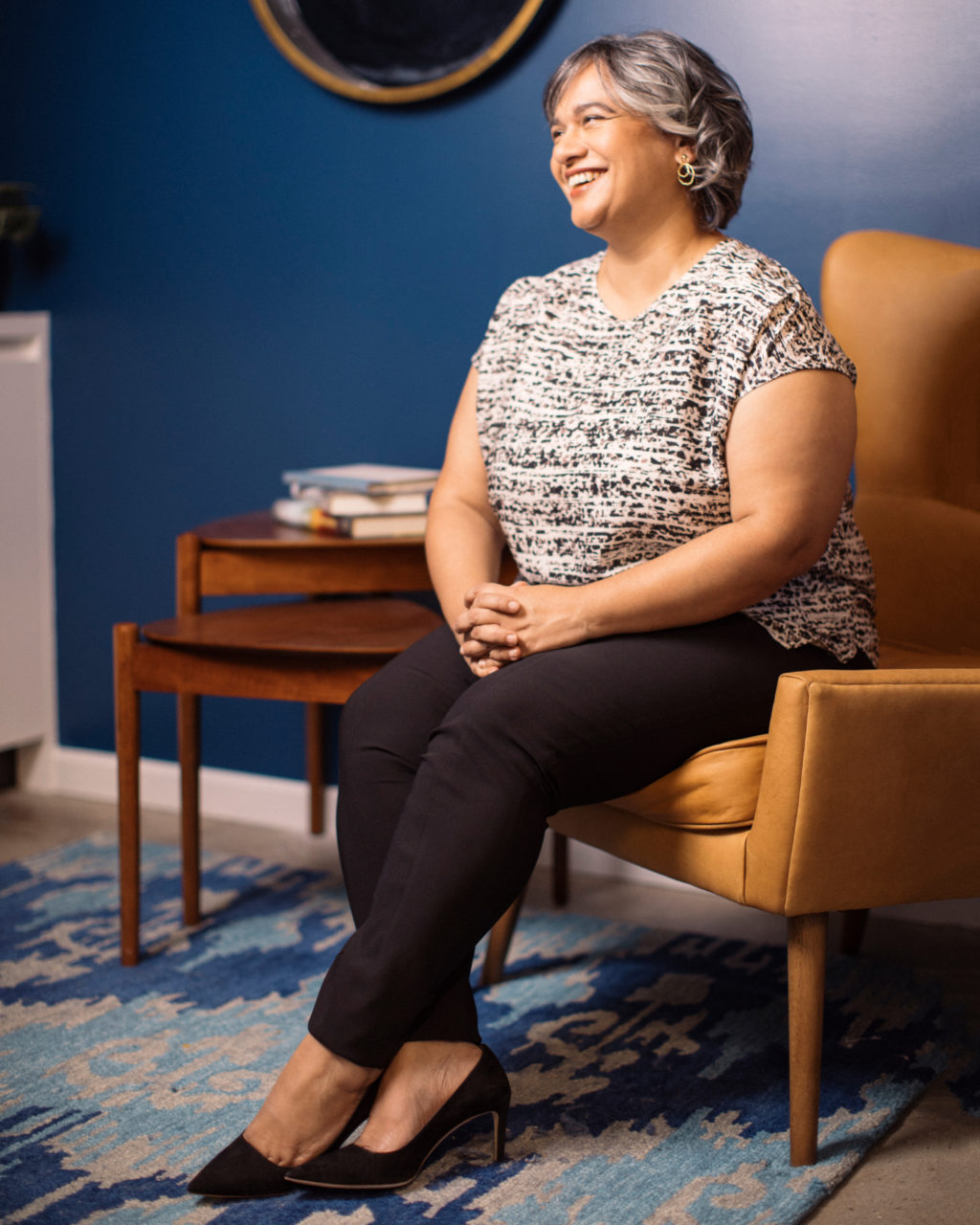
Sarina wears the Didion top in ink wash, the Foster pant in black, the Oberon earrings, and the Vanessa pump in black.
ALONE TIME IS MY MEDICINE—it’s the luxury of luxuries for me. I will go for walks in Fort Tryon Park in any season; it’s like a meditation. I’d say I’m an extroverted introvert. I’m very social and I enjoy people, but having two small kids, running an organization, and co-running a business with my husband—when I get time by myself, it’s a real treasure.
I TRAVEL A LOT, AND I’VE LEARNED TO BE A VERY LIGHT PACKER. It can be tough because I’m often traveling between different climates, and there are usually mosquitoes or insects to be mindful of. I need long sleeves that are airy and light, but cover me up. There’s nothing in my suitcase that doesn’t go with everything else, and I roll my clothes.
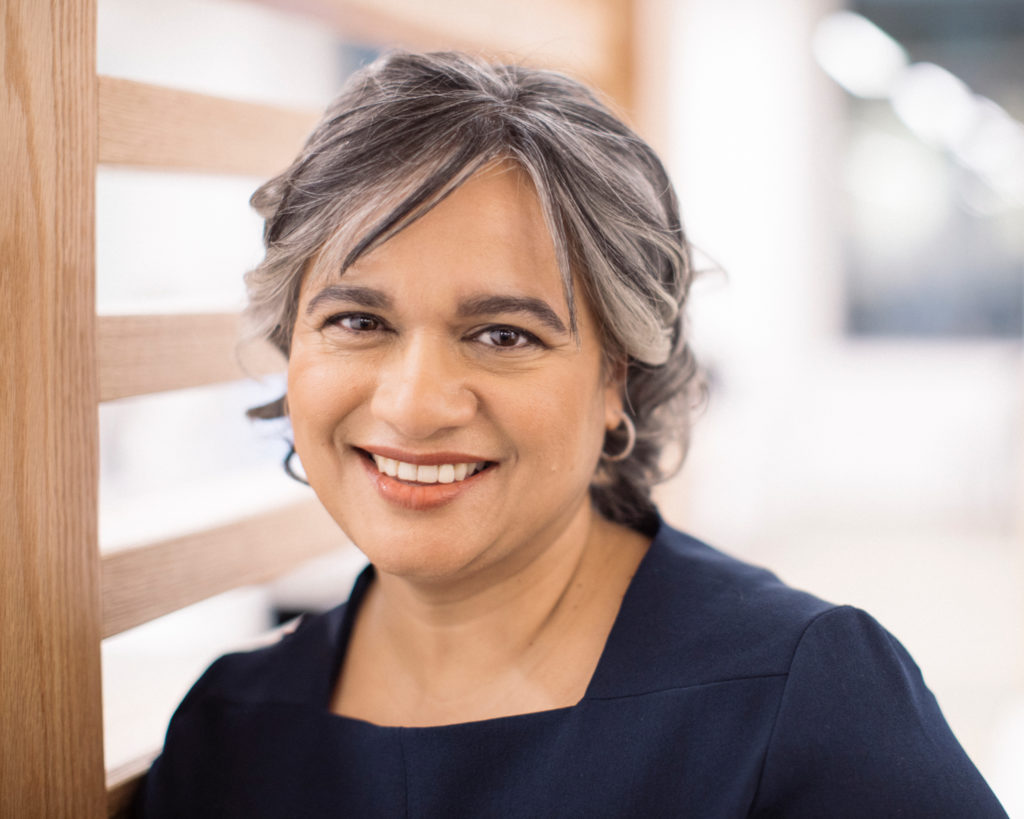
Sarina wears the Emily dress in galaxy blue and the Pave hoops in silver.
ONE OF THE HARDEST MOMENTS in my career was when I parted ways with an organization where I had worked for a very long time, and I didn’t have a new job lined up yet. It was not a comfortable experience, and I felt very lost for about six months. Ultimately, giving myself that space pushed me beyond my comfort zone. I remember talking with my dad about a job I was interested in, and I said, “There isn’t anybody like me who has a job like that. There’s nobody my age, there’s nobody with my background, there’s nobody I know or who I can relate to who has that job, so I’m not going to get it.” And he encouraged me to go beyond what I could picture for myself. I ended up getting that job, as the WaterAid country director in Ethiopia. And that’s how I got to where I am today, and met my husband, and gained so much confidence. Now I know that self doubt is an important part of my decision process. There’s always going to be a voice that says, ‘You can’t do this,’ but the key is not to let that stop you, ever.
Photographs by Rich Gilligan.





